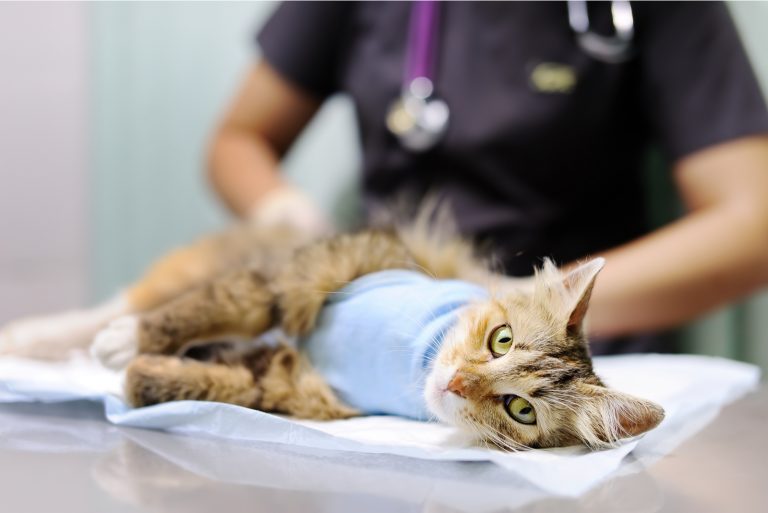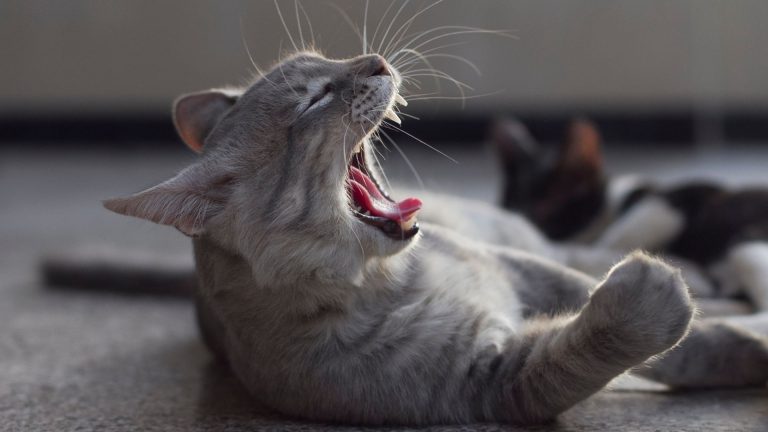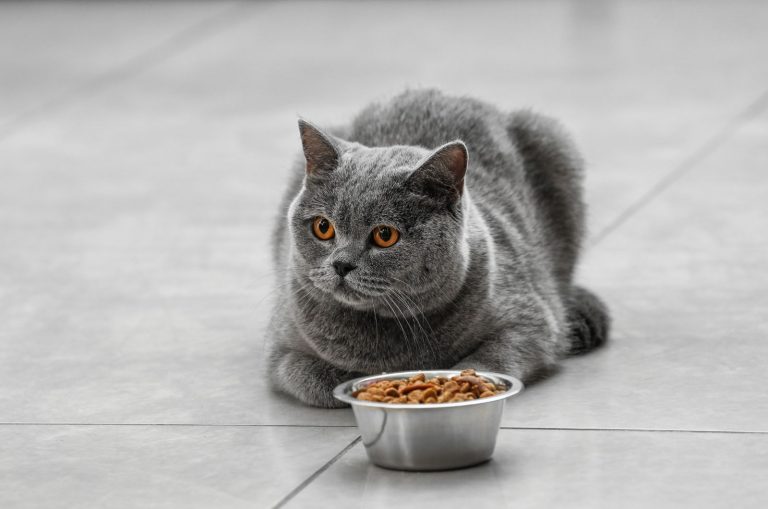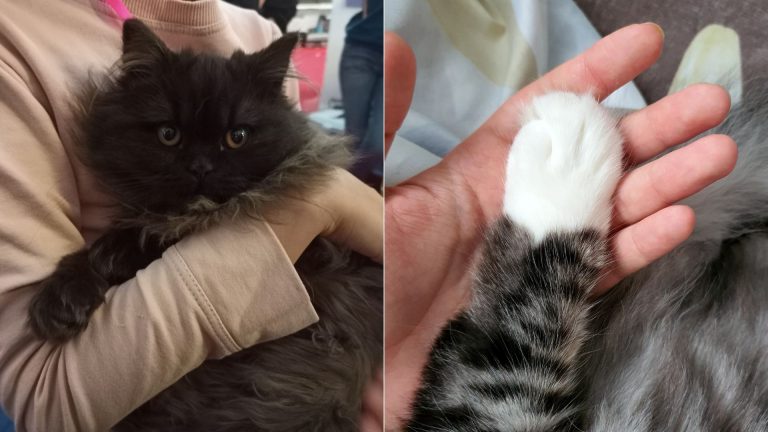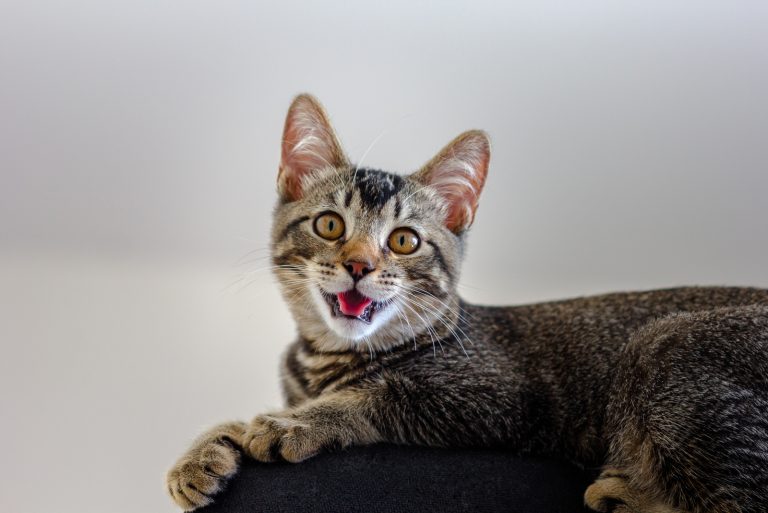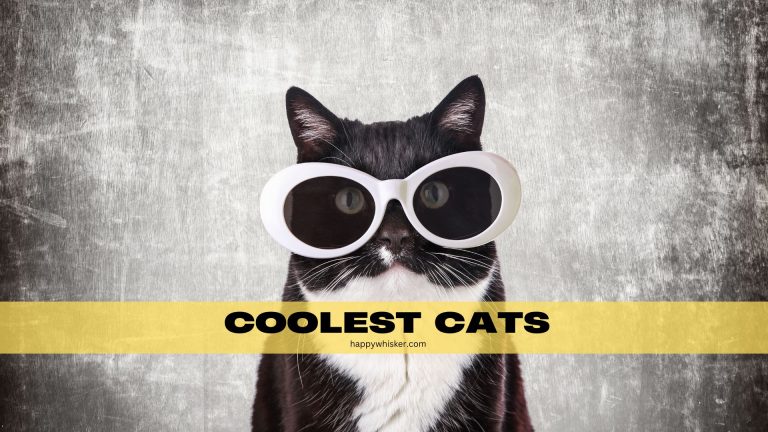Why Do Cats Pant? Learn When It’s A Cause For Concern
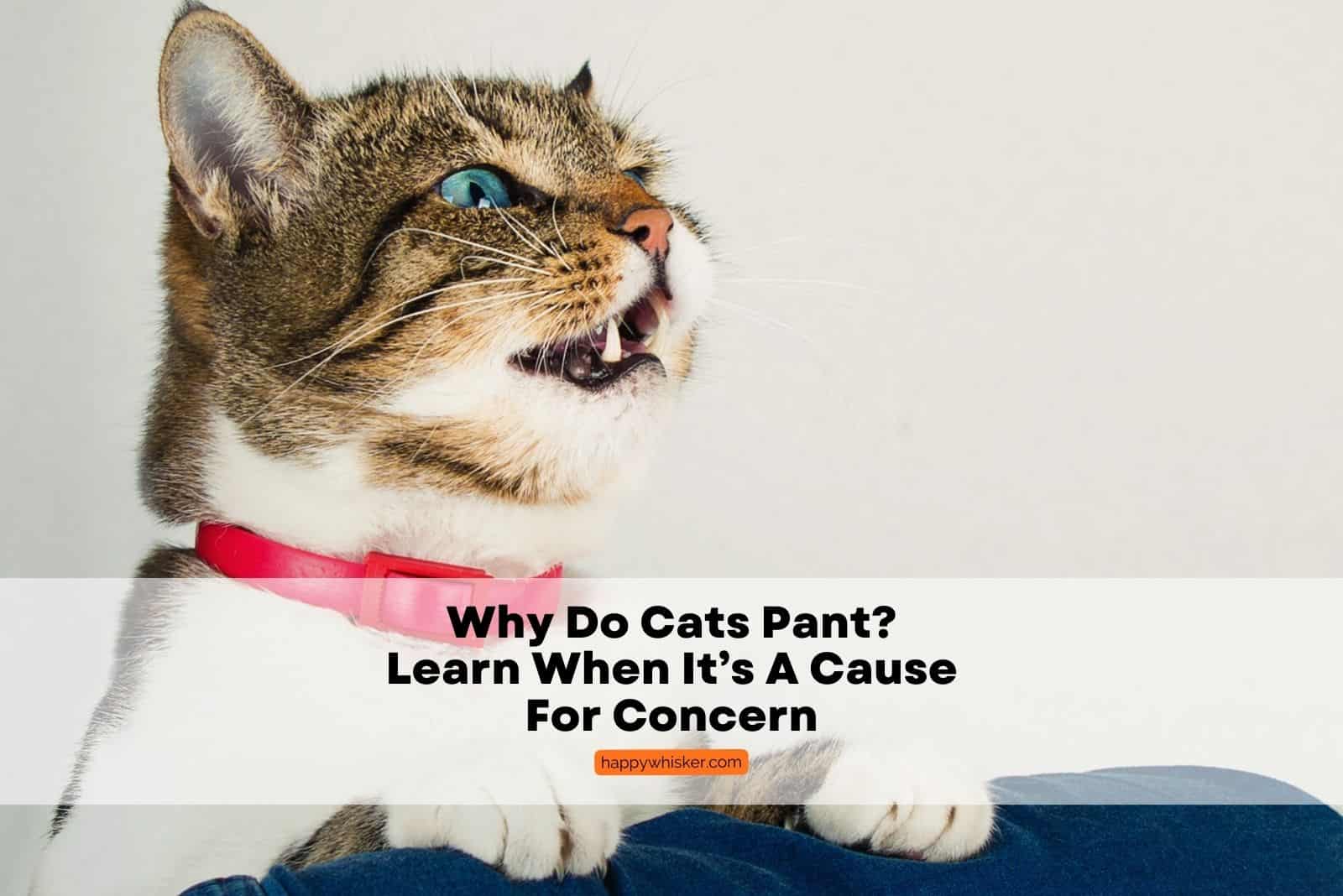
Do you ever wonder why your feline friend pants like a dog? Dogs often pant, but cats rarely do, although it is possible.
Panting in cats can occur after an intense playdate, due to overheating or exposure to stress. However, it can also be a sign of a serious underlying health condition.
Therefore, it’s important to know when your cat’s panting is a cause for concern, and when it is not.
In this article, we will explore the various reasons why cats pant, from the normal panting associated with exercise or heat, to the more serious causes such as respiratory and heart disease, hyperthyroidism, and more.
What Is Panting?
Panting is a process in which a cat takes rapid, shallow breaths through an open mouth.
Merriam Webster’s Dictionary defines panting like this: “to breathe quickly, spasmodically, or in a labored manner”
Panting is common in humans when they are physically active, in extreme heat, or when they have a fever. Common reasons for panting tend to be the same for cats as well!
However, panting can be a sign of a more serious health issue, for both humans and cats.
Signs A Cat Is Panting
There are signs a cat is panting:
• Increased breathing rate and/or heavy, rapid breathing
• Open mouth
• Tongue sticking out
• Flaring of the nostrils
• Eyes widely open
• Visible rib cage movement
If you’re unsure how a panting cat looks, check out the video below. Note: panting can be observed at 0:33.
The cat in this video was panting due to hot summer weather, and the cat got well again very soon!
Is It Common For Cats To Pant?
It is not very common for cats to pant. Many cat owners have never even seen their felines pant!
Panting is far more common in dogs, and it’s considered a normal way for them to regulate their body temperature.
Nevertheless, cats can sometimes pant, so let’s get to explaining why that happens!
Why Do Cats Pant?
Below, we will be discussing the 12 most probable explanations for why a cat might be panting.
1. Physical Activity
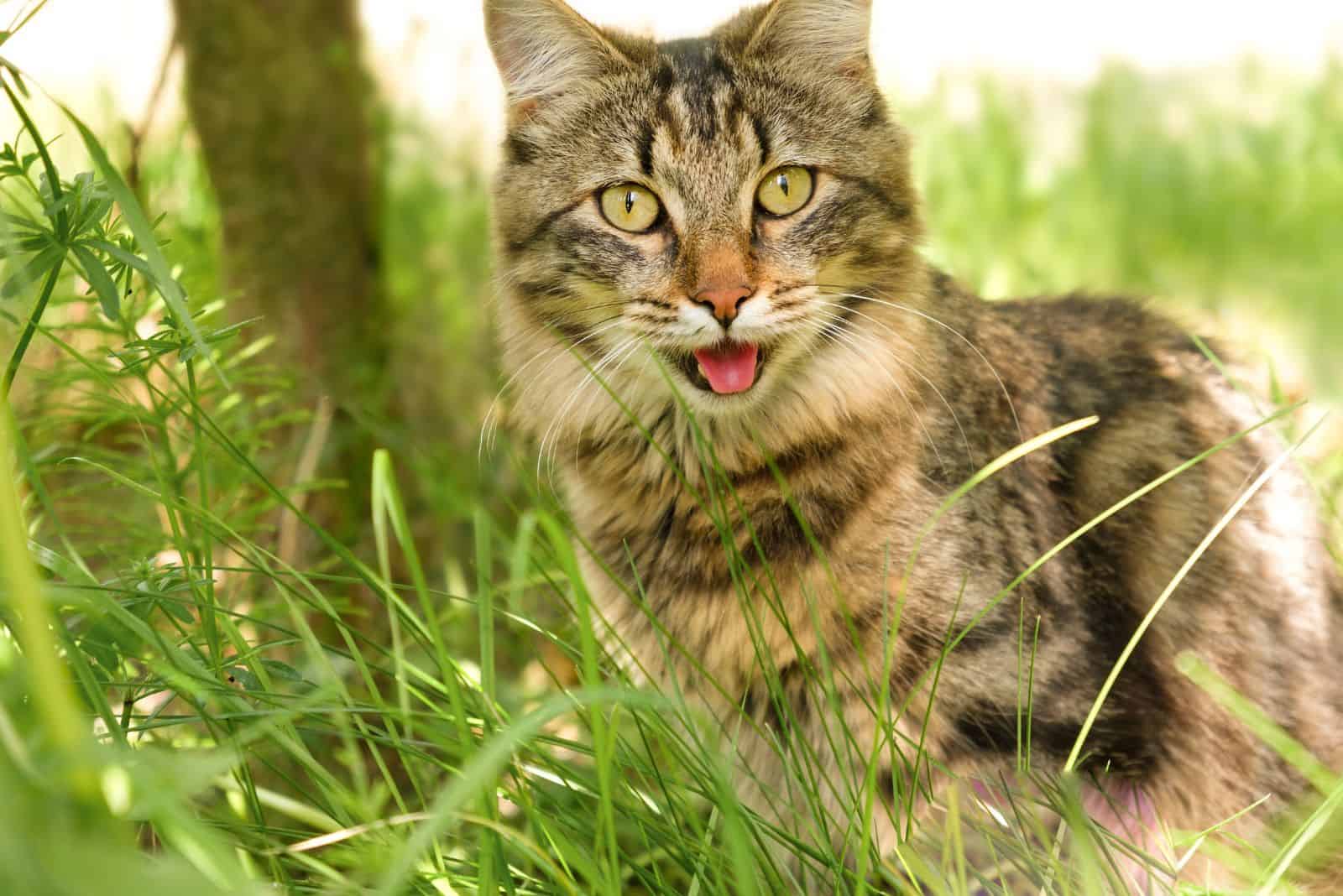
Cats are generally less active than dogs, but some cats can be quite playful and energetic.
They can get some physical exercise by randomly running around the house or jumping from one piece of furniture to another. Not to mention the physical activity their owners can create using a cat toy, such as a teaser wand!
When cats exercise, their body temperature rises, and they begin to pant to disperse heat and regulate their body temperature, much like dogs.
2. Heat Stroke
When a cat’s body temperature rises to higher-than-normal levels, the cat develops a serious condition known as heat stroke, often referred to as hyperthermia.
If the temperature of the environment gets too high for cats, or the cat has spent too much time in the sun, symptoms such as panting, drooling, and lethargy might arise.
Cats with heat stroke will pant in an attempt to dissipate the excess heat and cool down.
3. Stress
Some cats may pant when they are stressed, such as the cat in the video below.
The cat’s name is Gandalf and its owners were taking it to the vet for vaccination. As you can see clearly in 0:55, the cat’s reaction to exposure to stress was panting and restlessness.
Other signs of stress in cats include hiding, excessive grooming, increased vocalization, decreased activity, changes in appetite, and changes in litter box habits.
4. Fever
It is possible for a cat to develop a fever, which is a sign of an underlying medical condition or infection.
A temperature of higher than 102.5° F indicates fever in cats. Your cat is seriously in danger of suffering harm to their essential organs if their temperature rises beyond 106 °F.
Apart from elevated body temperature, signs of fever in cats include lethargy, dehydration, and behavioral changes.
Panting in cats with a fever is a sign of a cat trying to breathe faster to increase the amount of air they take in, which can help to cool down the body.
5. Respiratory Disease – Asthma, Bronchitis, Or Pneumonia
Respiratory disease in cats can relate to a variety of disorders such as asthma, bronchitis, and pneumonia.
Asthma is a chronic lung disease that causes inflammation and constriction of the airways, causing breathing difficulties for the cat, which might make it appear as if the cat’s panting.
The same goes for bronchitis, which is an inflammation of the large airways that lead to the lungs, known as bronchi.
Pneumonia is a serious infection of the lungs, which can lead to difficulty breathing and an increased effort to breathe, which can cause panting in the affected cat.
6. Hyperthyroidism
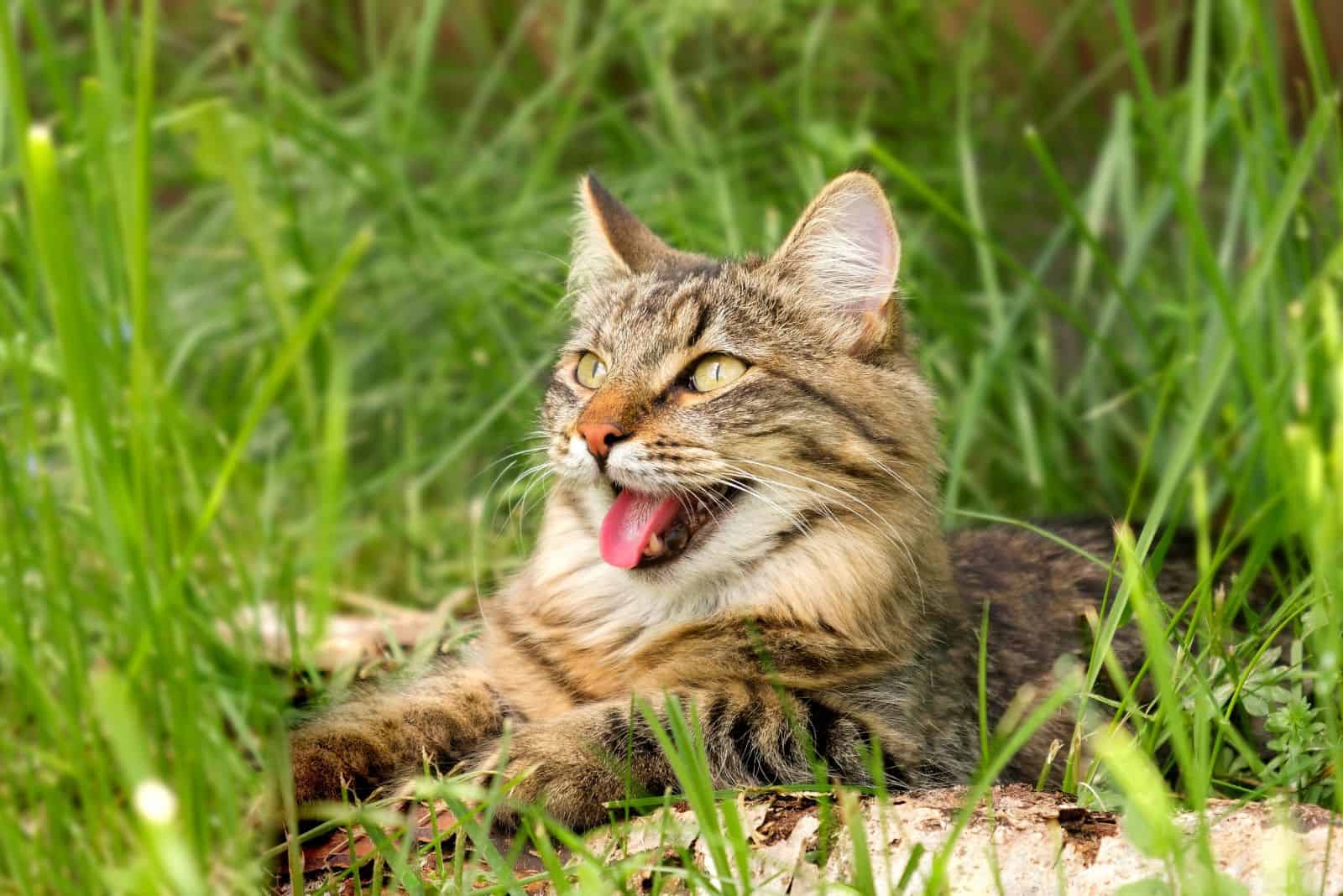
When the thyroid gland generates too much thyroid hormone, this leads to hyperthyroidism, a frequent endocrine condition in cats.
Some of the most typical signs of cat hyperthyroidism include weight loss despite increased appetite, increased thirst and urination, hyperactivity, and panting.
Because an overactive thyroid can raise the cat’s metabolic rate, raising the cat’s body temperature and the urge to expel heat, panting may be an indication of hyperthyroidism in cats. The act of panting helps the body cool down.
Furthermore, hyperthyroidism can raise blood pressure and heart rate, which can make it harder for the cat to breathe, resulting in panting.
7. Heart Issues – Cardiac Arrhythmias Or Congestive Heart Failure
Heart issues, such as cardiac arrhythmias or congestive heart failure, can be serious conditions in cats.
Cardiac arrhythmias are abnormalities in the heart’s rhythm. A common symptom of this health issue is breathing difficulties.
A medical condition known as congestive heart failure (CHF) occurs when the heart cannot pump enough blood to fulfill the demands of the cat’s body, resulting in breathing difficulties for the cat.
In both cases, the cat may pant as a way to try to get more oxygen into its body.
8. Anemia
You’ve probably already heard of anemia, as many people suffer from it today, but let me remind you once more.
Anemia refers to a reduction in the amount of red blood cells, hemoglobin, or both. Red blood cells contain hemoglobin, a protein, which carries oxygen to the body’s tissues.
Panting can be a sign of anemia in cats because anemia causes a decrease in the oxygen-carrying capacity of the blood, which can cause the cat to become short of breath.
The symptoms of anemia in cats vary depending on the severity, duration, and cause of the condition, but the most common symptoms of anemia in cats include: fatigue, decreased appetite, rapid breathing, and shortness of breath.
PetMD notes that: Iron deficiency anemia is extremely rare in cats and occurs only if there is chronic, severe blood loss, or extremely unbalanced diets.
Therefore, if your cat is exhibiting any of these symptoms, it is crucial to seek veterinary attention promptly.
9. Heartworm Disease
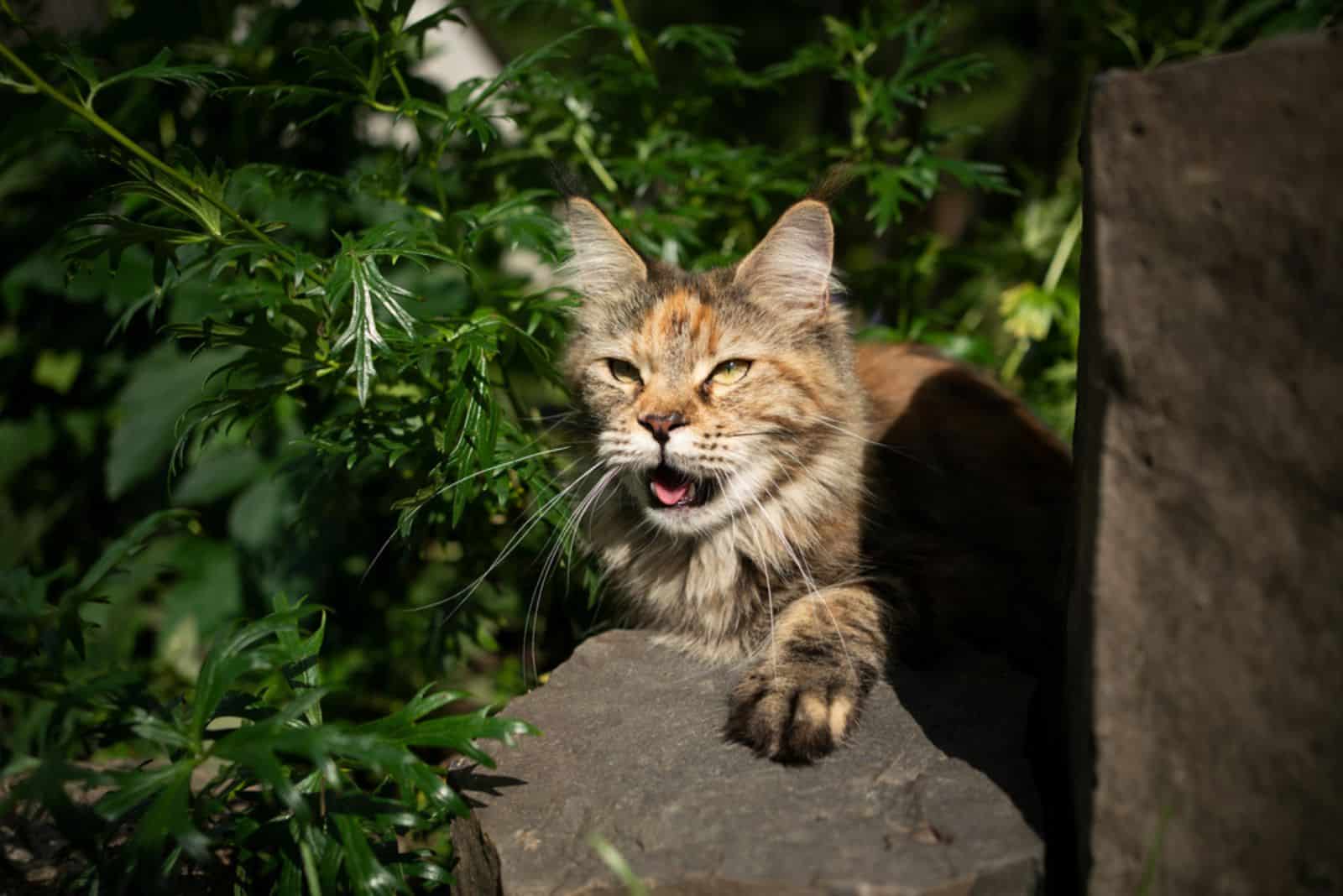
Cats and other animals, most notably dogs, are susceptible to the dangerous and sometimes deadly condition known as heartworm disease.
A parasitic worm called Dirofilaria immitis, which is spread to cats by the bite of an infected mosquito, is the cause of the illness.
Heartworm illness in cats can cause a variety of symptoms, including coughing, breathing problems, vomiting, weight loss, and lethargy.
Panting can be a sign of heartworm disease in cats because the worms can cause damage to the heart and lungs, leading to difficulty breathing.
Panting can be a sign of pain or discomfort, which could be a result of heartworm disease.
However, panting is not the primary symptom of heartworms, so if your cat is panting and not showing any other symptoms of heartworm disease, the cause of the panting most likely isn’t heartworm disease.
10. Medication Side-Effect
It is possible for a cat to pant due to a reaction to certain types of medication.
If your cat has recently started taking a new medication, and is panting (perhaps even showing other symptoms), then it’s very possible it’s a side-effect of the medication, or even an allergic reaction to the medication.
Medications that affect the respiratory system, such as bronchodilators, also cause panting; as does prednisone.
Prednisone is often given to cats to treat a variety of conditions, but it does have side-effects, one of which is shortness of breath and difficulty breathing. These side-effects can occur even at lower doses of this medication.
Cat owners, please, if your cat has recently started taking a new medication and is experiencing panting or any other symptoms, consult with a healthcare professional the first chance you get.
11. Foreign Object Ingestion
Foreign object ingestion in cats is a common problem seen in veterinary practice. It is a condition in which a cat has ingested a foreign object, such as a string, toy, or other small item.
Panting is not typically a symptom of foreign object ingestion in cats. However, if the foreign object is causing an obstruction in the gastrointestinal tract, it can cause difficulty breathing, which may be accompanied by panting.
More common symptoms a cat has ingested a foreign object are vomiting, diarrhea, and abdominal pain.
12. Injury
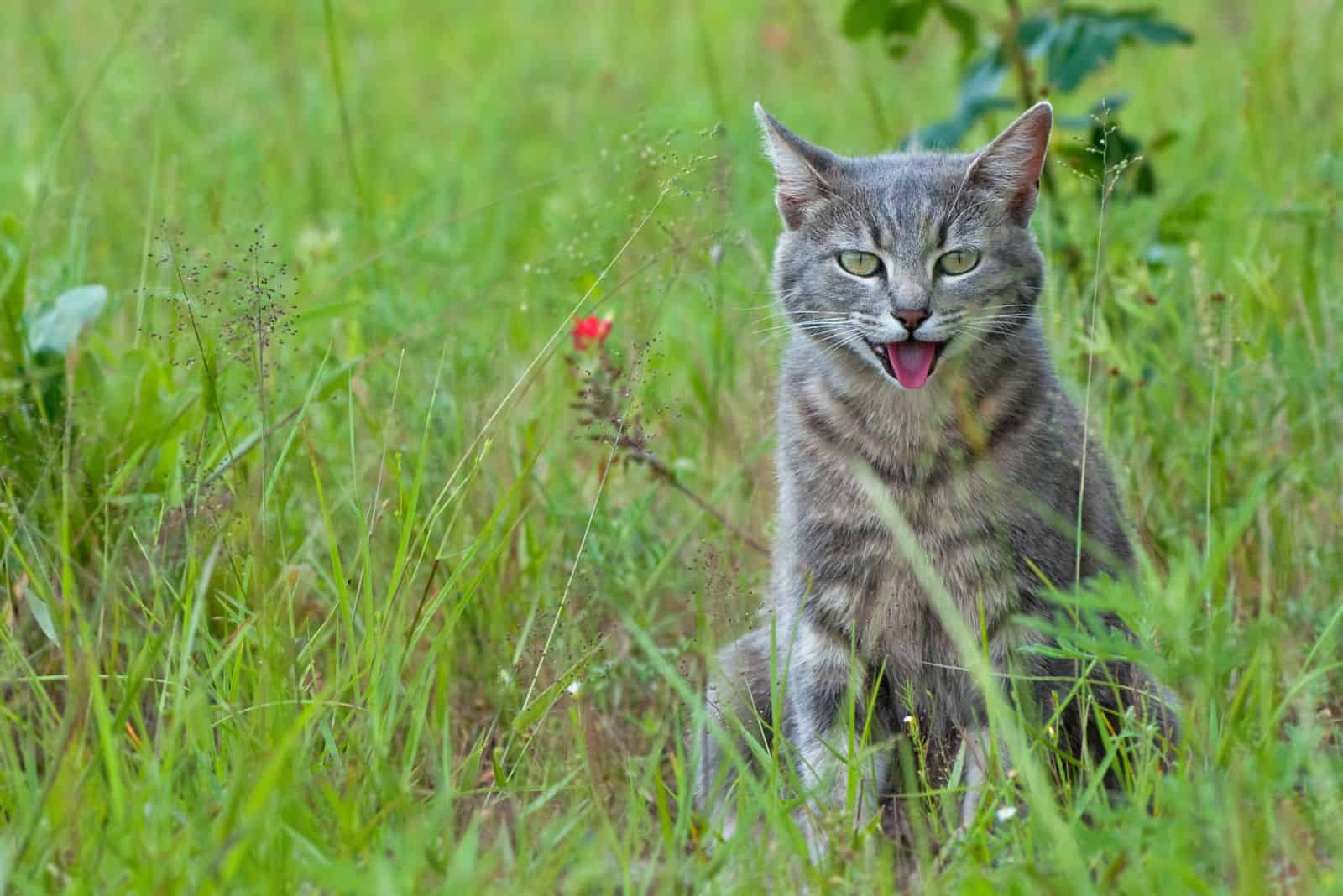
Another potential cause of panting in cats is sustained injury.
Trauma or injury can cause a cat to experience pain and discomfort, which can lead to panting as a response to the stress.
It is also possible for the panting to be caused by sudden release of adrenaline, which causes rapid breathing.
Additionally, injuries or trauma can cause inflammation and swelling, which can make it difficult for a cat to breathe properly, leading to panting.
Note that panting is not the main symptom of sustained trauma in cats; there will be other, more obvious signs your cat is injured.
What Should You Do If You Notice A Cat Panting?
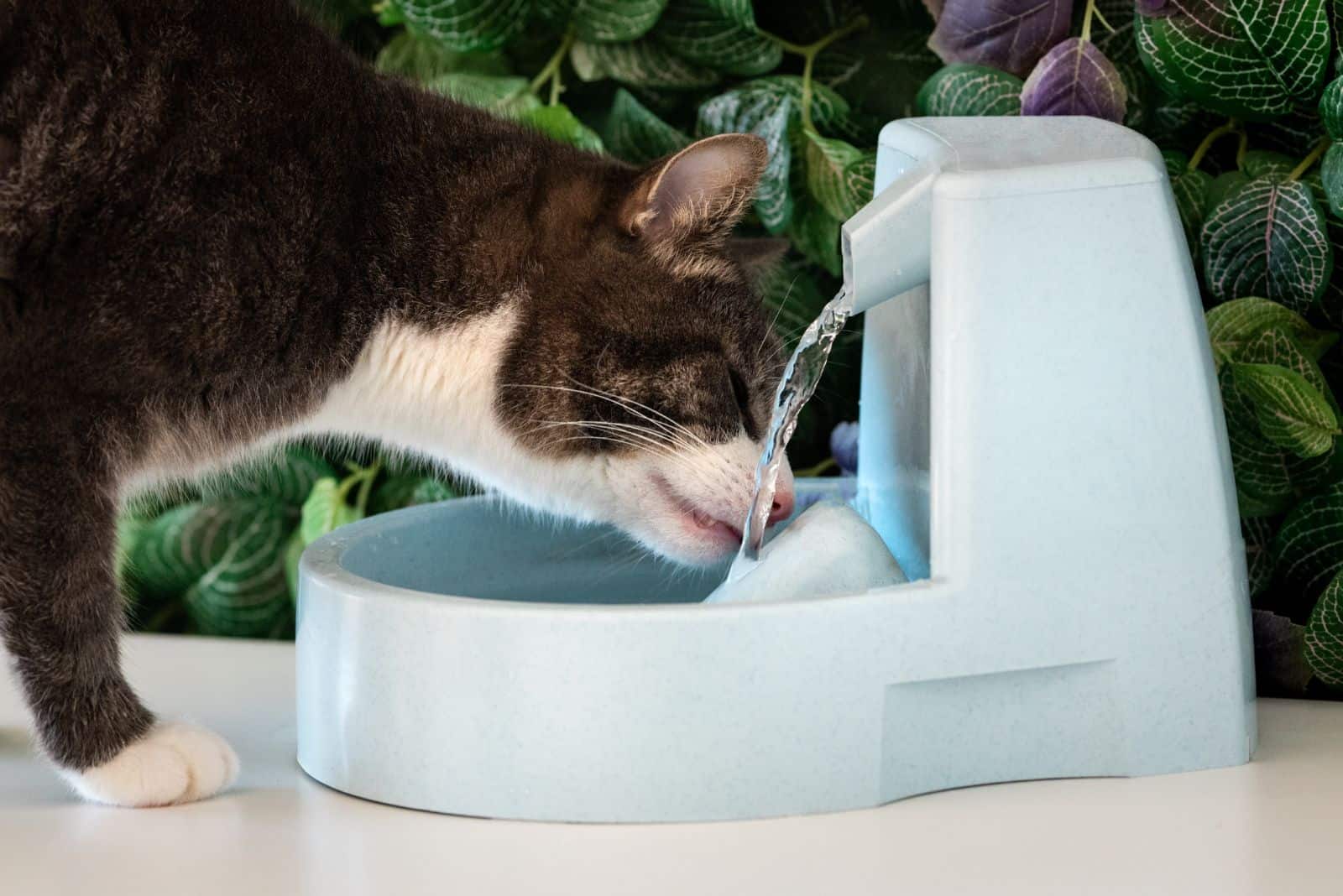
If you notice your cat’s panting, this is what you should do:
• Try to figure out what might be causing your cat to pant.
Was your cat very active for the last 10-15 minutes? Is your cat experiencing stress and anxiety for some reason? Was your cat outside in the sun and became overheated?
• If you conclude that the cause of panting is exercise, stress or overheating, act accordingly.
Make sure your cat gets some rest and provide water if the cause of panting is exercise. If the cat is stressed, try to remove the cause of stress and make your cat feel more relaxed. When it comes to overheating, make sure your cat cools down and provide lots of fresh water for it to drink.
In each case, the panting should stop after 15-20 minutes maximum.
• If you cannot find the cause of panting, take your cat to the vet.
As I’ve mentioned, a number of health issues can cause a cat to pant, such as respiratory or heart issues. The cause of panting can potentially be very dangerous for your cat, so your cat might be in need of professional help.
What Can You Expect At The Vet’s?
If you’ve determined that the cat’s panting needs professional care, you might be curious to know what you can expect when you go to the vet’s.
The first step would be describing your cat’s symptoms, when they started, and your cat’s medical history.
What follows is a physical examination to check the cat’s overall health.
The vet will first see if they can rule out physical exercise, overheating and stress as the potential causes of panting.
If that’s the case, the veterinarian may recommend some laboratory tests to help diagnose the cause of your cat’s panting, such as a complete blood count (CBC) and a blood chemistry panel.
If your veterinarian suspects an underlying condition such as a respiratory or heart problem, they may recommend an X-ray or ultrasound.
If the vet suspects a specific cause of the cat’s panting, they will carry out further, more specific testing to finally confirm the cause of panting.
There are different treatment options for a panting cat, depending on what’s causing the cat’s panting. This is something your vet will discuss with you.
How Can You Prevent A Cat Panting?
Although panting is not always a sign of ill-health, you’ll still want to prevent your cat panting in the first place.
How do you do that? These are some tips and tricks:
• Make sure your cat has plenty of fresh, clean water available.
If your cat is an energetic one, who is prone to playing until exhaustion, the most important thing is to provide the cat water so that the cat can re-hydrate.
• Provide your cat with a cool environment, such as a fan or air conditioner.
When the temperatures are higher than usual, it would be wise to keep the room temperature pleasant, as that will prevent your cat (and you) from overheating.
• Make sure your cat is not overly stressed or anxious.
As stress is a common cause of panting in cats, it’s best you try to find out what makes your cat stressed or anxious. Is it vet visits? If so, try to find a way to help your cat relax, such as using pheromone diffusers.
• Have regular veterinary check-ups.
It would be good to go for a veterinary health check-up every once in a while, even if your cat is not sick.
Regular check-ups can help identify potential health problems early on, when they are often more treatable. This can help prevent more serious issues from developing and ensure that your cat receives the appropriate care as soon as possible.
FAQ
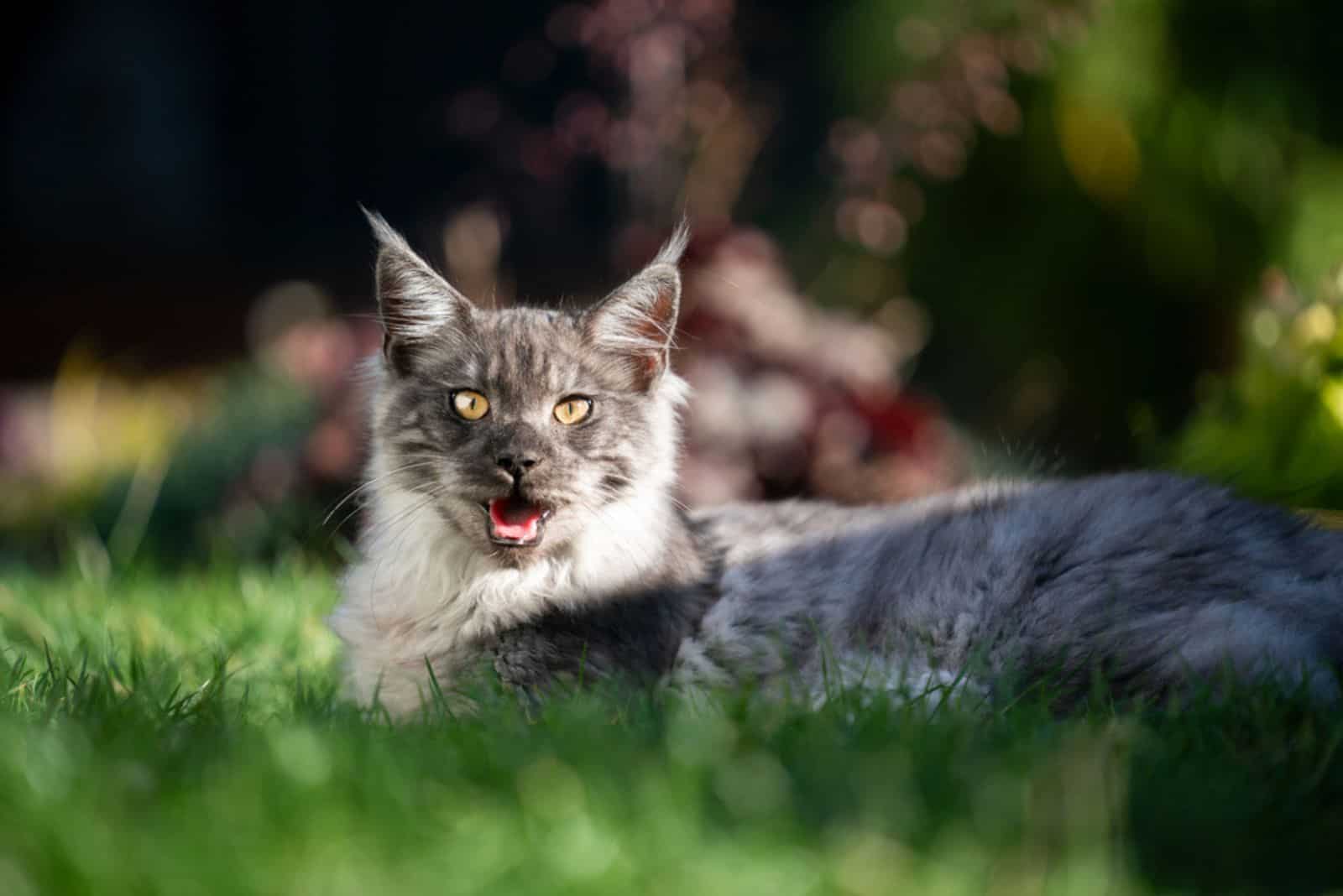
Do Cats Pant When Dehydrated?
Yes, it is possible for a cat to pant due to dehydration. When the cat’s body is dehydrated, it is unable to maintain a steady temperature. As a result, the body temperature rises. This can lead to panting as an attempt to cool the body down.
Do Cats Pant For Attention?
Cats are very smart creatures and some cats find sneaky ways to trick their owners into giving them attention. So yes, it is possible for a cat to pant purely for attention.
However, note that this is very unlikely to happen. It’s more likely that they pant due to other reasons such as stress, pain, or physical activity.
Do Cats Pant When Overstimulated?
It is possible for a cat to pant due to too much physical exercise, and even due to mental overstimulation. Stress is a common cause of panting in cats, so make sure not to rule it out as a potential cause of your cat’s panting.
Is It OK For My Cat To Pant After Playing?
It’s normal for cats to pant after playing or engaging in physical activity, as this helps them to cool down. It’s commonly observed in very active, energetic kitties who love a good playdate with their owner.
However, it is important to ensure a cat has access to fresh water and a cool place to rest after playing, and if a cat appears to be panting excessively, contact your vet.
How Long Is Too Long For A Cat To Pant?
Most of the time, if the panting is caused by physical exercise or stress, the panting should stop any time up to about 15 minutes.
If a cat is panting for more than 15 minutes or so, and if the cat is showing other symptoms of ill-health, then that’s a sign something else is causing the cat’s symptoms.
I would advise you to go to the vet if your cat does not stabilize its breathing 5-15 minutes after stopping physical exercise.
What Can I Do To Help My Cat Stop Panting?
How you can help your pet depends on what’s causing your cat to pant.
If the cause of panting is physical exercise, such as running after a cat chaser wand, you should just let your cat rest and provide some water.
If the cause of panting is stress, then try to calm your cat down so the cat feels at ease.
If you’ve determined the cause is not exercise or stress, then the panting could be a sign of an underlying health issue that needs to be taken care of by a vet.
In Conclusion
Although panting in cats is not as common as it is in dogs, it’s still possible for you to notice your cat panting.
The most common causes of panting in cats include physical exercise, overheating and stress.
Other potential causes of panting are underlying health issues, such as respiratory and heart issues, hyperthyroidism, or even heartworms.
Your feline friend may pant after a play session, but it’s important to know when it’s normal and when it’s a cause for concern.
If your cat is panting for no obvious reason, please go see a vet.
And that’s it for this article! I hope it was informing, and has provided you with an answer why your cat might be panting.
Stay safe and healthy!

